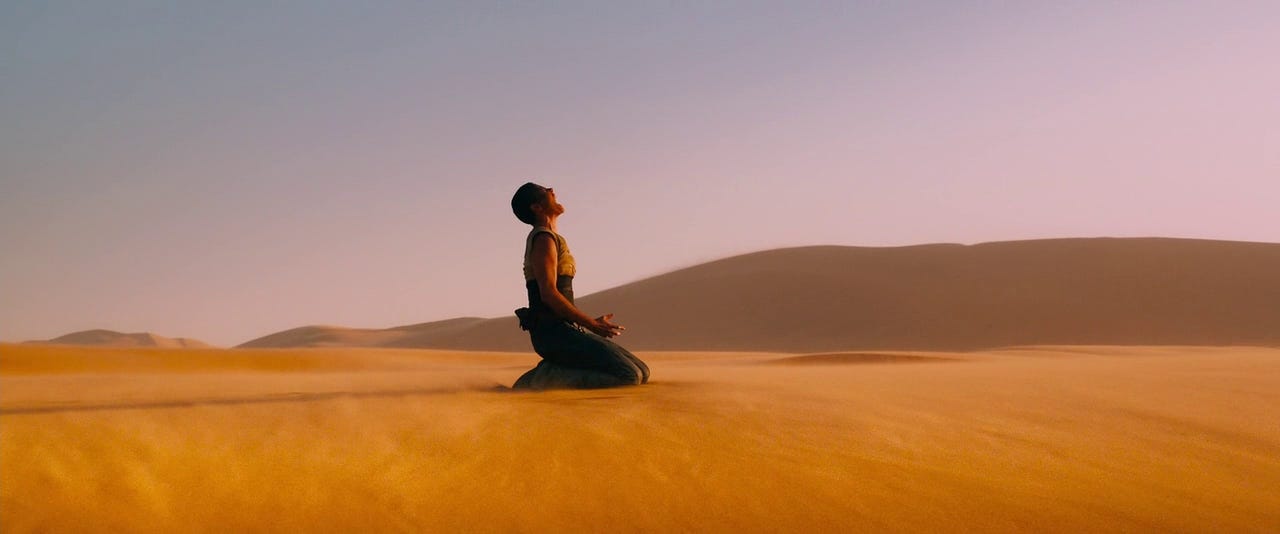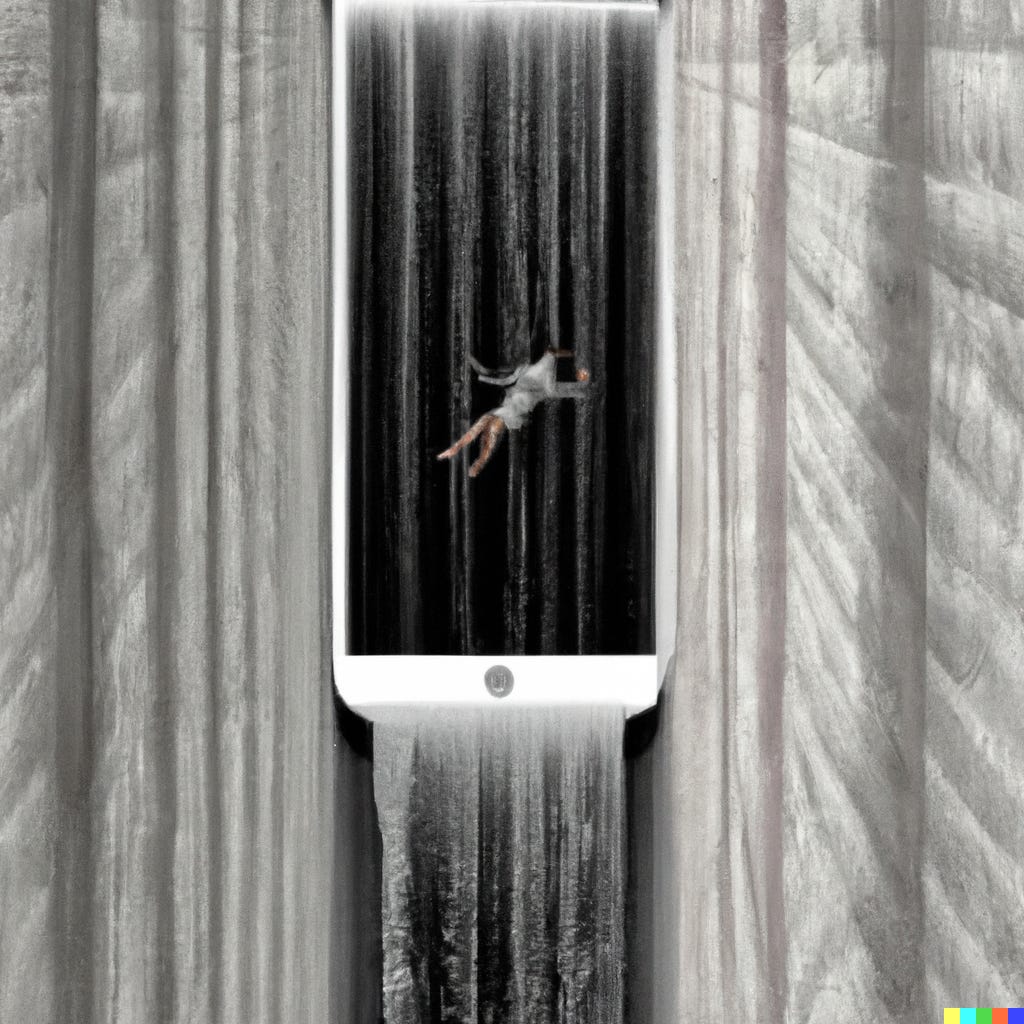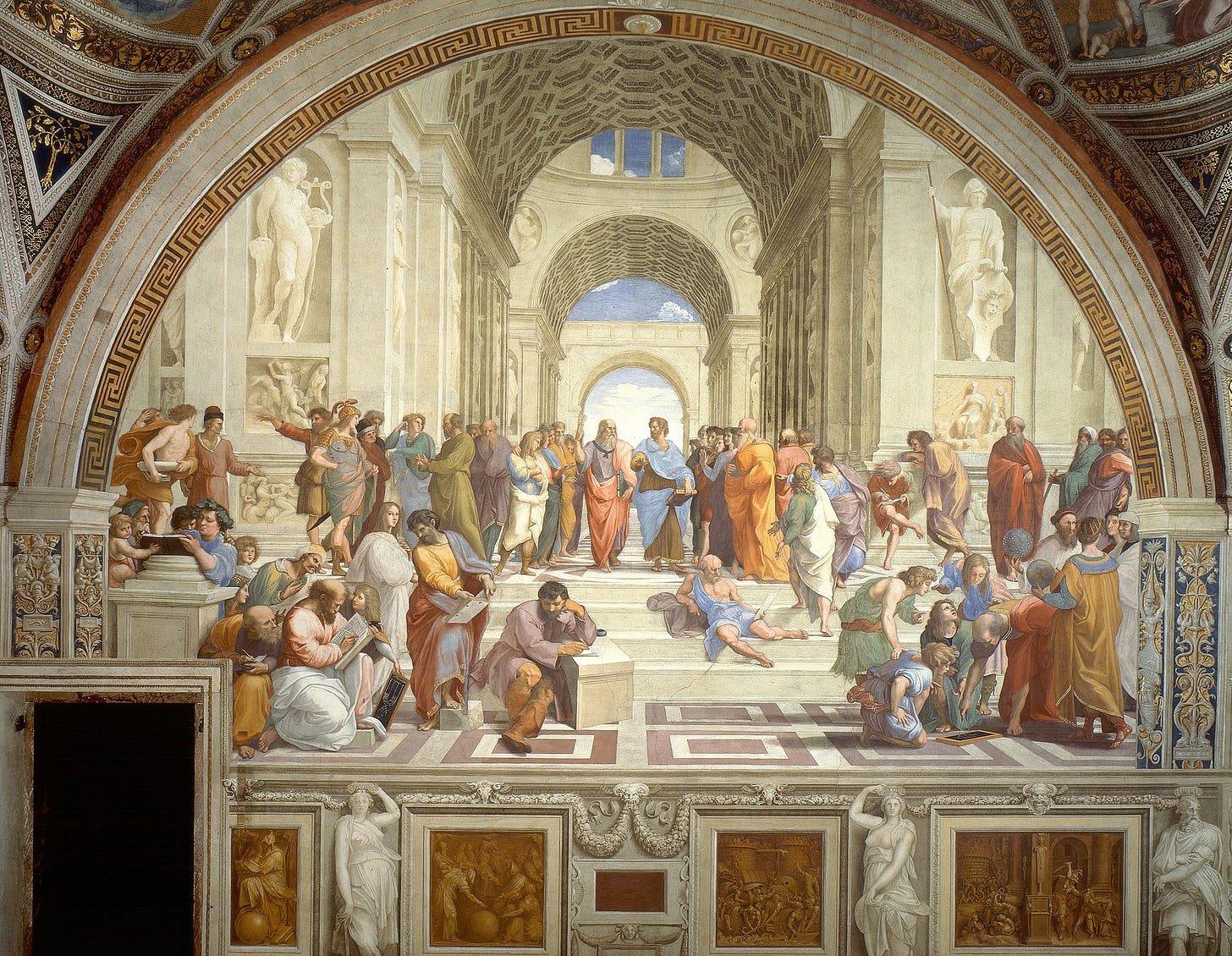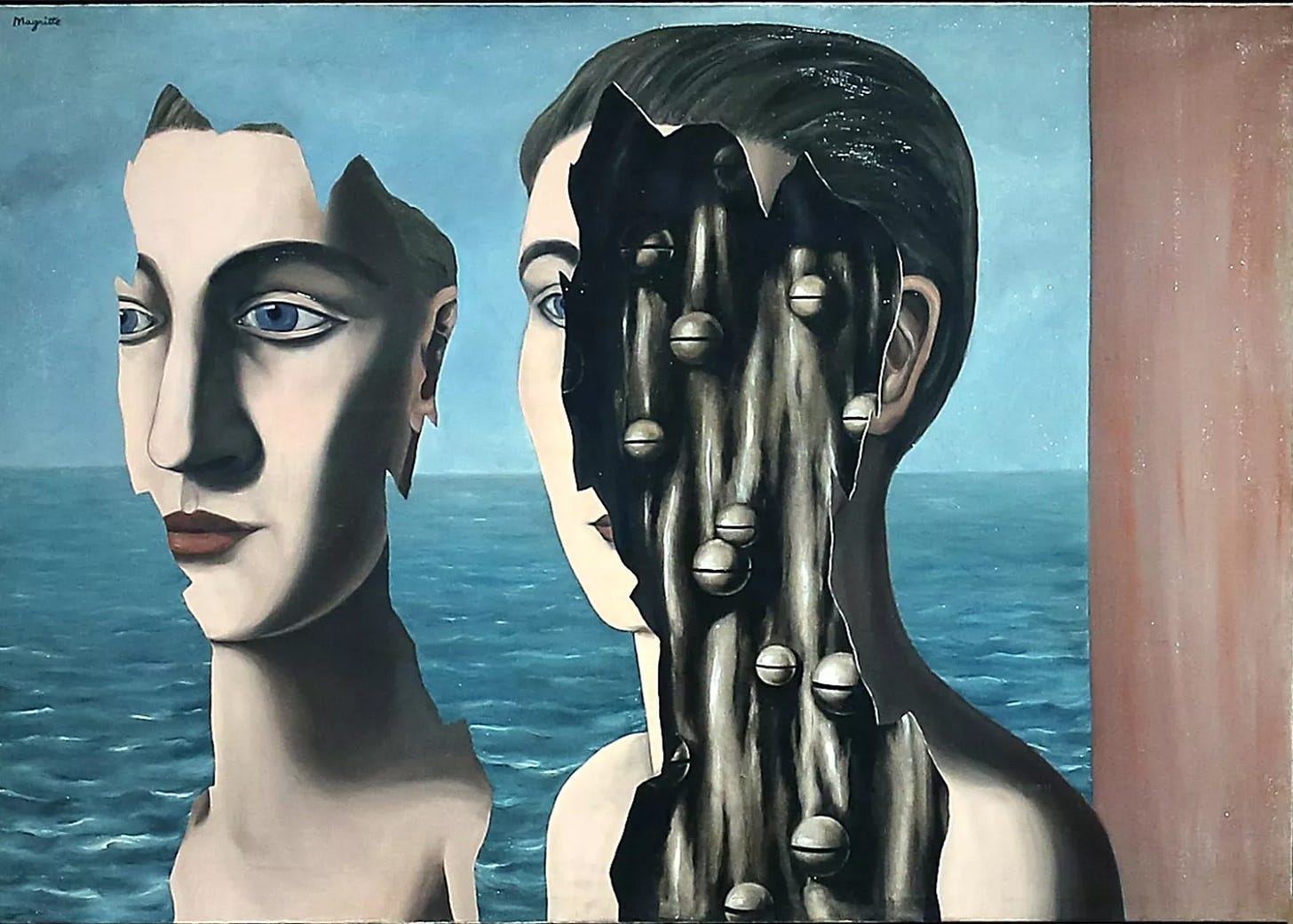On the Death of Cinema.
An essay on the contentification of visual culture and cinema's place in society.
This article is an examination of cinema’s supposed decline as a cultural and creative force past the turn of the millennia. Instead of blatantly proclaiming streaming services as cinema’s nemesis, I want to have a more insightful look at the evolution of cinema as an art and comment on the dilution of visual culture to content.
My focus here will be to examine several claims by great cinema auteurs about cinema’s decline. I will move further to discuss the evolution of cinema as an art form and contrast how the modern state of media consumption has corralled it.
The Keepers of the Keys
So through the night rode Paul Revere;
And so through the night went his cry of alarm
To every Middlesex village and farm, —
A cry of defiance, and not of fear,
— Henry Wadsworth Longfellow, “Paul Revere's Ride”Why do so many auteurs and intellectuals deride the current state of visual media culture ? What are some of the arguments they make in this regard ?
In his essay, Il Maestro, Martin Scorsese argued that cinema and the corresponding viewing experience is being devalued to the lowest common denominator “content”.
“Content” became a business term for all moving images: a David Lean movie, a cat video, a Super Bowl commercial, a superhero sequel, a series episode. It was linked, of course, not to the theatrical experience but to home viewing, on the streaming platforms that have come to overtake the moviegoing experience, just as Amazon overtook physical stores.
- Martin Scorsese, ‘Il Maestro’
Using Federico Fellini’s (his idol’s) works as the trail, he guides us onto a path towards a greater understanding of storytelling through cinema. His claim is modern cinematic atmosphere is being depleted of innovative, standalone, unique stories that exist in and of themselves. In his eyes, powerful cinema is becoming rarer as the viewers (and consequently theatres) steer toward more anodyne, cursory sequences of moving stills that are fed to them instead of discovered.
Infamously, Scorsese said that the Marvel movies weren’t “cinema”. He later clarified that this wasn’t meant to be a slight, and he respects the artists who work on these projects. He only meant that these movies which follow a common trope and are made to fit into a cinematic universe do not count as “a cinematic experience”. Ridley Scott, Denis Villeneuve and Quentin Tarantino have all had similar criticisms of the state of cinema currently.
Keep in mind, Scorsese is no Luddite. He does not blindly shout back in the face of change. He’s embraced change several times during his long career—digital cameras, streaming services, etc. So for him to be adamant about this means that these qualms are deep-rooted for him.
Susan Sontag wrote in her essay ‘The Decay of Cinema’ wrote that cinephilia had come under attack and that we as a generation no longer have a characteristic love of movies that defined the decades that came before us.
But you hardly find anymore, at least among the young, the distinctive cinephilic love of movies that is not simply love of but a certain taste in films (grounded in
a vast appetite for seeing and reseeing as much as possible of cinema’s glorious past).- Susan Sontag, ‘The Decay of Cinema’
A lot of factors have led to this vanished love of cinema. She claims that movies are reduced to assaultive images with faster and faster cut times that don’t demand someone’s attention.
Her essay was written in 1996 but feels particularly relevant today. Think back. When was the last time you went to the cinema to watch an indie film? Or how many times do you actively seek to watch a movie rather than endlessly scrolling on Netflix for SOMETHING TO PASS AS PASSIVE ENTERTAINMENT. When have you gone to the cinema for another other than a big blockbuster movie or thriller sequel (or god forbid some Fast and Furious movie, GOD, WHEN WILL THEY STOP THOSE).
My point is—Cinema and cinephilia are in decline. The rapturous love of cinema and storytelling has faded. It is now being replaced by content. We have come under attack.
Our generations’ Paul Reveres are shouting out their cry of alarm.
The Rift
We need not to be let alone. We need to be really bothered once in a while. How long is it since you were really bothered? About something important, about something real?"
- Guy Montag, Fahrenheit 451
Is there a foundational difference between art and content ? If there has always been a tug-of-war between cinema for industry and cinema for art, why the tantrum now ?
Based on the essays of Sontag and Scorsese and my personal experiences, I want to give 2 reasons for why I made that claim above:
1. Content is Transactional. Art is a Gift.
In his article Content v Art, Thomas Bevan argues that content is a transactional product. The impluse is the same as advertising. It is looking for something from you. Not necessarily monetary. They can be transactions of time as well.
Content is simply an informercial for itself, for its creator, perpetually and forever. Which is why content binges bring about this vague unease and sensation of being trapped in a mirrored maze where you and your chosen content guru are shouting affirmations at your own refracted and distorted reflections.
Art on the other hand is equivalent to the nature of gift-giving. An artist distils themselves, their experience and perspective into a piece of work that is offered to the bystander. The bystander more often than not has no expectation of what they will encounter when experiecing it for the first time. Just like unwrapping a gift.
The objective of this distinction is not to draw a line in the sand but to help you understand my current view of the state of visual culture. I see it as content masquerading as art. We have become so burnt on this landslide of content that our acuity can no longer help us make the difference between what’s worth watching and what’s worth experiencing. A subtle but valuable distinction.
2. The Blurring of Cinema and Visual Content
Past the turn of the millennia, I believe that the line between cinema and visual content has become blurred, with each seeping into the other’s territory. We are subconsciously unable to distinguish between the forms of media that we consume, and thus dilute it all down to the same thing – “content”. The technological state of the world have made it the perfect breeding ground to allow this dilution. Why ?
Echo-chamber algorithms – The ‘Related’ tab. Ah, the hallmark of the modern viewing experience. It is ubiquitous. YouTube. Netflix. Prime. Amazon. Google. UberEats. If it provides you with a service, it probably has a ‘Related’ tab. We live in the perfect time for these algorithms to take shape. The oodles of data out there coupled with the long arm of corporate greed have devised algorithms to make us stay on the platform as long as possible. The content is designed to be use-and-throw material for the brain. Watch a reel, chuckle, scroll - oh another reel just like the ones before. In such fashion, the ‘Related’ tab has inhibited our ability to explore and discover and serves to feed us what we might like to stay on as long as possible.
A Pedestrian viewing experience – With the mobile phone and the laptop increasingly becoming people’s primary option to view movies, it devalues the magic that films provide. Since we view almost all our visual content on these devices, we subconsciously associate a movie as another piece of visual content. Watching a movie becomes like watching a long reel. Hit Play. Oh, a notification. I’ll get back to the flick in a second. Dang, another memo, let’s get to this and then go back. Phew, finally back, let’s continue. Awwwww shit, I had to send that mail …… The film is no longer an all-encompassing experience. Cinema cannot be truly enjoyed when you cannot be filled by it. A phone or a laptop can never be conducive for watching.
Since now movie theatres are shifting to primarily running ‘safe’ movie options, the cinematic experience has been commodified and sold out. This coupled with the viewers indulgence in the contentified visual experience leaves little room for the exploration of movies that “colour outside the lines”.
Perhaps Sontag could say it better than I ever could
The sheer ubiquity of moving images has steadily undermined the standards people once had both for cinema as art and for cinema as popular entertainment.
- Susan Sontag
The Metamorphosis
How does this impact cinema, really ? Doesn’t art change ? Why should it be different this time around ?
Throughout our cultural history, not only do forms of artistic expression evolve, but also their position in our society.
Painting was seen as a means to capture reality or vivid stories. From the cave paintings in Africa by ancient cave dwellers to Waterlilies by Monet, we have time and time again managed to conjugate our perception of reality into paint, pixel or porcelain and share it through that medium.
Painting and the fine arts became our way of understanding this world and passing it on as a succinct visual story. There was nothing better.
But then along came the commercially accessible photograph in the mid 1800s. Suddenly there was a far less painstaking and far quicker way of capturing reality. The photograph could capture as much detail as a painting could. Consequently, the fine arts were relieved of their duty to express realistic stories. They were soon unleashed upon the unseen, the unspoken—the “unreal”.
Take a look at ‘The School of Athens’ by Raphael from the 16th century.
Now look at ‘The Double Secret’ by Rene Magritte in 1927.
Abstract Expressionism, Cubism and Surrealism were art movements born out of the liberation from the need to capture reality. They explored terrains unseen. Paintings assumed a fundamentally different role in the realm of human expression.
Once again, in the wake of the mass-market video camera, the photograph was relieved of its duty to capture what the eye saw. Videos served that role now. The video became our default mode of experiencing a slice of someone’s view of reality. The photograph now represented something different. A great photograph was viewed as a unique artistic expression. The freezing of time on a film. Reality stuck in a tiny square.
Similarly, I think cinema’s position in society is changing. It used to be the perfect escape. An unspoken communal agreement to be enveloped by music and machine. Exclusive and surreal. But now, it is becoming something different. I believe content is to cinema what video is to the photograph. Content now is our tiny, free and quick mode to be wrapped up in another reality. Cinema will become something else. Perhaps this is the cocoon stage. I don’t know when the butterfly will come.
The Call to Arms
In the hour of darkness and peril and need, The people will waken and listen to hear. The hurrying hoof-beats of that steed, And the midnight message of Paul Revere. — Henry Wadsworth Longfellow, “Paul Revere’s Ride”
Where do you, the reader, stand amidst all of these changes ? What is your mission, should you choose to accept it ?
I claimed that cinema and cinephilia have faded. But I also said that it they are underrgoing a change. A cocoon stage if you will. Now this is not all doom and gloom because you dear reader have great agency amidst this whole change.
I want to inspire believe to “discover” cinema again. None of this will stop or break the capitalist commodification of cinema, but it might just rekindle the joy of unwrapping the gift of art.
The love that cinema inspired, however, was special. It was born of the conviction that cinema was an art unlike any other: quintessentially modern; distinctively accessible; poetic and mysterious and erotic and moral -- all at the same time. Cinema had apostles. (It was like religion.) Cinema was a crusade.
- Susan Sontag
I firmly believe that movies are the closest we will ever get to dreaming awake. And this is uniquely valuable. It is the great liberator. The Lisan-al-Gaib. It is both powerful and subtle. It can lead to not only great revelations but also quiet introspection. The ability to forget the world and your problems for those 2 hours in a dark room is almost hallucinogenic.
But it is on the cusp of a radical change in its position in society. The illness it suffers from is pernicious but not fatal. Debilitating but not incurable.
My remedy for it lies in the agency of you - the reader. Talk to your friends about an imaginative movie that you saw. Have conversations with your cinephile friends about finding these diamonds in the rough, and see what they say about it. Make use of a spirited soul instead of an anodyne algorithm to expand your culture repertoire. Help curate a collective love of visual culture. If you don’t have “cinephiliacs” in your milieu (I suggest you get some :P) or if you want to diversify your tastes, use resources like MUBI and The Criterion Channel to curate your appreciation for great cinema. Go to your local indie theatre semi-regularly. Go to the cinema when they do a re-run or show classics / iconic movies.
Let me reiterate, I am not protesting watching movies of a cinematic universe or rewatching guilty pleasures. Anyone who knows me knows my deep love of Star Wars, Denis Villeneuve and Old Pixar. My protest is against an algorithm and a like button tunnelling your mind. My protest is against a notification bell breaking through the entrancement of a scene. My protest is against the mindless scrolling for something to remind you of a sound and sight. The remedy I believe is a cure to these.
Most of all however, remember to share. I want more people to have discourse about movies and the beauty they carry. Never forget
Pass on what you have learned.
- Yoda
Here’s to hoping that you awaken and hear, the midnight message of Paul Revere.
Until next time.








A perfect essay that captures the deterioration of the cinema in today's time. As someone who is really obsessed with unique and original films, Everything Everywhere All at Once felt like a breath of fresh air last year, especially when the cinema in general is dominated by reboots and films following the similar monotonous trope.
Loved your writing, especially the way you bifurcated 'The Rift' section into 2 parts, making it easier for the readers to follow every word. The research, OH MY GOD, I got to learn so so much! And this is was what I love about this community! So, thank you so much for curating it all!
One thing I would also love to see is your take on original ideas vs reboots in today's time and how the cinema has become a commercial space for big production companies to only make money and not looking after the quality of the films they put out.
Oh and, this statement,
"Art on the other hand is equivalent to the nature of gift-giving. An artist distils themselves, their experience and perspective into a piece of work that is offered to the bystander. The bystander more often than not has no expectation of what they will encounter when experiencing it for the first time. Just like unwrapping a gift."
My only complaint is that this isn't mine! Perfectly encapsulates the relationship between an artist and its audience!
Looking forward for more of these Keane :)
Great essay!
I'd never thought of content replacing cinema in this way. "content is to cinema what video is to photograph" - I like that.
Usually I'm not a fan of "people just don't appreciate art anymore" arguments, as I think its more like "culture is evolving, and art with it, and the art that was once mainstream is becoming more niche, just as new art is coming to the surface" - but that's not the full story either. The context in which we experience art greatly impacts its significative power to us. Short form content like Instagram reals remove this context, whereas cinemas create it.